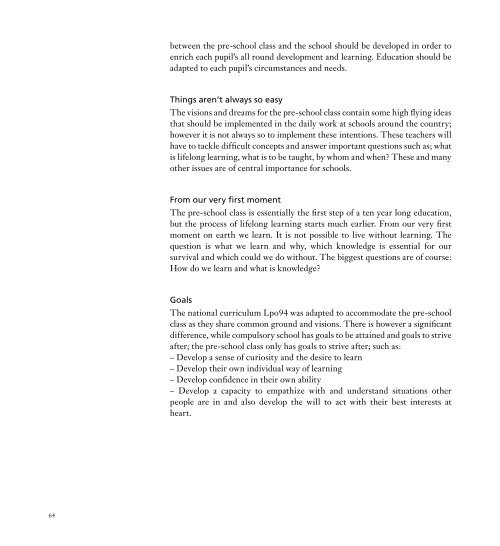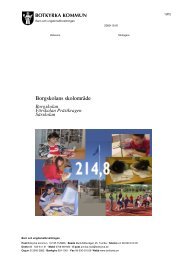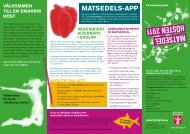Förskoleklassen - i en klass för sig.pdf
Förskoleklassen - i en klass för sig.pdf
Förskoleklassen - i en klass för sig.pdf
Create successful ePaper yourself
Turn your PDF publications into a flip-book with our unique Google optimized e-Paper software.
etwe<strong>en</strong> the pre-school class and the school should be developed in order to<br />
<strong>en</strong>rich each pupil’s all round developm<strong>en</strong>t and learning. Education should be<br />
adapted to each pupil’s circumstances and needs.<br />
Things ar<strong>en</strong>’t always so easy<br />
The visions and dreams for the pre-school class contain some high flying ideas<br />
that should be implem<strong>en</strong>ted in the daily work at schools around the country;<br />
however it is not always so to implem<strong>en</strong>t these int<strong>en</strong>tions. These teachers will<br />
have to tackle difficult concepts and answer important questions such as; what<br />
is lifelong learning, what is to be taught, by whom and wh<strong>en</strong>? These and many<br />
other issues are of c<strong>en</strong>tral importance for schools.<br />
From our very first mom<strong>en</strong>t<br />
The pre-school class is ess<strong>en</strong>tially the first step of a t<strong>en</strong> year long education,<br />
but the process of lifelong learning starts much earlier. From our very first<br />
mom<strong>en</strong>t on earth we learn. It is not possible to live without learning. The<br />
question is what we learn and why, which knowledge is ess<strong>en</strong>tial for our<br />
survival and which could we do without. The biggest questions are of course:<br />
How do we learn and what is knowledge?<br />
Goals<br />
The national curriculum Lpo 94 was adapted to accommodate the pre-school<br />
class as they share common ground and visions. There is however a <strong>sig</strong>nificant<br />
differ<strong>en</strong>ce, while compulsory school has goals to be attained and goals to strive<br />
after; the pre-school class only has goals to strive after; such as:<br />
– Develop a s<strong>en</strong>se of curiosity and the desire to learn<br />
– Develop their own individual way of learning<br />
– Develop confid<strong>en</strong>ce in their own ability<br />
– Develop a capacity to empathize with and understand situations other<br />
people are in and also develop the will to act with their best interests at<br />
heart.<br />
Terra Incognita<br />
Two roads diverged in a wood, and I<br />
– I took the one less travelled by,<br />
And that has made all the differ<strong>en</strong>ce.<br />
Part of the poem the Road not Tak<strong>en</strong> by Robert Frost<br />
The pre-school class constitutes a unique opportunity for teachers and pupils<br />
to create a meaningful learning <strong>en</strong>vironm<strong>en</strong>t. Together they have the chance<br />
to break new, unchartered ground. There are those who feel appreh<strong>en</strong>sion for<br />
the changes that the pre-school class will bring, but there are also many who<br />
welcome this new chall<strong>en</strong>ge, and together with our six year olds will discover<br />
new roads on this lifelong journey.<br />
Story behind the story<br />
For as long as there has be<strong>en</strong> day-care, pre-schools and the like, society has<br />
<strong>en</strong>deavoured to provide for the needs of six years olds. Par<strong>en</strong>ts and teachers<br />
have <strong>en</strong>couraged them to take more responsibility, six year olds were allowed<br />
to stay out longer, at home and in the pre-school yard, they were allowed<br />
and <strong>en</strong>couraged to be more advantageous, climb f<strong>en</strong>ces; help out in the kitch<strong>en</strong><br />
and apply themselves to more difficult tasks. They were exposed to new<br />
pedagogical approaches such as; six year group, a-b-c groups, reading and<br />
writing groups, school preparation groups, cross curriculum groups; the<br />
purpose of these groups has always be<strong>en</strong> to create a bridge betwe<strong>en</strong> day care<br />
and compulsory education.<br />
Formed in its own cast<br />
The pre-school class became an integrated part of the mandatory school<br />
system early in the 1990s as a result of am<strong>en</strong>dm<strong>en</strong>ts made in 1991 to the<br />
Education Act, which made it possible for six year olds to begin school. There<br />
were also demographic reasons for this am<strong>en</strong>dm<strong>en</strong>t, many years of smaller<br />
classes created a vacuum in schools with empty facilities and classrooms. There<br />
was a baby boom in the late 80s and now there was an opportunity for six year<br />
olds to avail themselves of the school <strong>en</strong>vironm<strong>en</strong>t which in turn paved the<br />
way for an organisational integration into the mandatory school system.<br />
64 65








